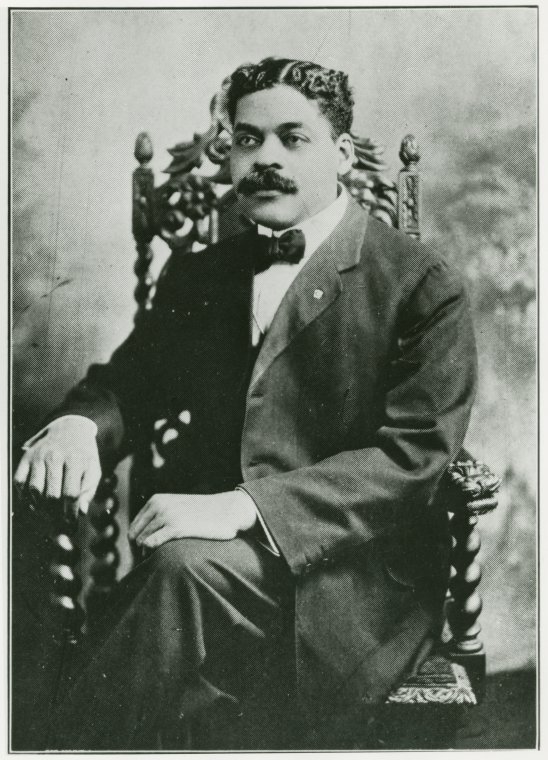
Photo: Schomburg Center for Research in Black Culture, Photographs and Prints Division, New York Public Library
An activist-intellectual whose work was critical in the development of African and African diaspora studies writ large, Arturo Alfonso Schomburg died on June 10, 1938.
Schomburg was born on January 24, 1874, in San Mateo de Cangrejos, Puerto Rico, to Mary Joseph, a free Black laborer from St. Croix. The relationship between his mother and his father, Carlos Federico Schomburg, is unknown, as are the details of much of his early life, but he offered as a reason for his collecting the story that, as a child, he’d been told by a teacher that Black people had no history.
Schomburg arrived in New York City in 1891 with his mother and shortly thereafter joined the independence efforts of Afro-Cuban and Afro–Puerto Rican communities. Participating in the Sección Puerto Rico (Puerto Rican Section) of the Partido Revolucionario Cubano (Cuban Revolutionary Party) and Club Borinquen, Schomburg additionally co-founded Las Dos Antillas in 1892. The same year, Schomburg was initiated into the El Sol de Cuba Lodge Number 38, a Masonic order founded by Afro-Cubans and Afro–Puerto Ricans in Brooklyn. Over the years, he ascended in Masonic leadership, eventually becoming associate editor of the Masonic Quarterly Review and editor of the Transaction, both Black Masonic journals, and in 1918 becoming the grand secretary of the Great Lodge of the State of New York. Professionally, Schomburg oversaw the Caribbean and Latin American Mail section at the Bankers Trust Company from 1906 to 1929, when he retired and dedicated the remainder of his life to his intellectual work.
Schomburg was a Race Man, the designation for men of his era dedicated to the advancement of peoples of African descent, and he became a leader in collecting and preserving historical records. Schomburg co-founded the Negro Society for Historical Research in 1911 and served as its secretary and treasurer. In 1914, he joined the American Negro Academy, an organization dedicated to the publication of scholarly works, and served as its president from 1920 to 1928. In 1925 he was initiated into the Omicron chapter of the Kappa Alphi Psi fraternity at Columbia University. In 1926, Schomburg sold his private library to the Carnegie Corporation for donation to the 135th Street Branch Library of the New York Public Library (NYPL) in Harlem to amplify its Division of Negro Literature, History and Prints. It became known informally as the Schomburg Collection. As a result of his donation, the Harmon Foundation awarded him a bronze medal and a cash prize for educational excellence; with the prize money, Schomburg traveled to Europe for the summer in 1926, visiting archives and museums in Spain, France, Germany, Belgium, and England to recover early modern documents on the African diaspora. From 1930 to 1932, Schomburg served as the curator of Fisk University’s Negro Collection, thereby replicating in the Jim Crow South what he had achieved in New York City. This was the first time in his life in which Schomburg was paid for the work for which he would gain renown. After Fisk, he returned to New York as the curator of his collection at the 135th Street Branch Library. An active member of the Association for the Study of Negro Life and History (today the Association for the Study of African American Life and History), he served as an associate editor of the Journal of Negro History. He held both positions until his death.
More than a collector, bibliophile, and archivist, Arturo Schomburg was a husband and father, a curator, an arts patron, a popular public speaker, a bibliographer, an editor, and a writer whose work was published in several of the most important periodicals of his day. His short articles reflected his dedication to an accessibility of educational materials, as did his curation of exhibitions at NYPL and YMCA branches, the classes he taught at the Harlem History Club and the Harlem YMCA, and his lectures for the Harlem Experiment in Community Adult Education. Schomburg was survived by his seven children—his firstborn had died within his first year of life—and his third wife, Elizabeth Green. He had been twice widowed.
In 1972, the 135th Street Branch Library was renamed the Schomburg Center for Research in Black Culture and recategorized as one of only four NYPL research libraries. Today its collection holds more than 11 million items; it remains the premier archive dedicated to the history and culture of peoples of African descent.
Vanessa K. Valdés
City College of New York
Tags: In Memoriam Long Overdue Archives African American History Migration/Immigration/Diaspora

This work is licensed under a Creative Commons Attribution-NonCommercial-NoDerivatives 4.0 International License. Attribution must provide author name, article title, Perspectives on History, date of publication, and a link to this page. This license applies only to the article, not to text or images used here by permission.
The American Historical Association welcomes comments in the discussion area below, at AHA Communities, and in letters to the editor. Please read our commenting and letters policy before submitting.
Comment
Please read our commenting and letters policy before submitting.






